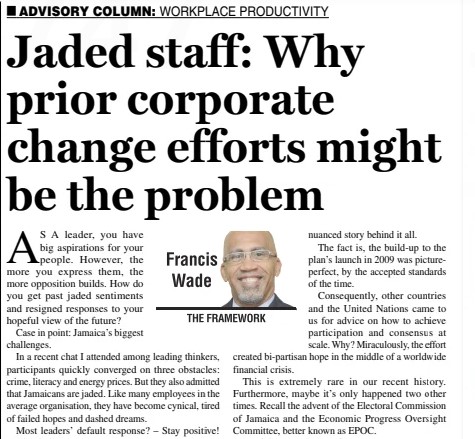As a leader, you likely have ambitious goals for your team. But the more you share your vision, the more resistance you seem to face. So, how do you move beyond jaded staff members and their skeptical responses to new futures?
A Real-World Example: Jamaica’s Key Challenges
In a recent discussion among thought leaders, three major issues emerged as Jamaica’s toughest challenges: crime, literacy, and high energy costs. Yet, they also agreed that the public is jaded, worn out from unmet expectations and dashed dreams. Like employees in many organizations, there’s a deep-seated cynicism that has taken hold.
For CEOs and government leaders, the typical response has been to “stay positive” or “push harder.” However, when there’s a legacy of failure, these well-meaning platitudes can often make things worse.
Let’s explore this dynamic through Vision 2030 Jamaica, a national development plan that, despite its initial inspirational promise, has become a barrier to achieving new aspirations.
A Picture-Perfect Start
Recently, the Prime Minister announced that Jamaica is unlikely to achieve “developed country” status by 2030. News outlets highlighted this as a failure of Vision 2030, the nation’s first comprehensive National Development Plan. However, there’s a deeper, more complex story here.
When Vision 2030 was introduced in 2009, it was an exemplary initiative by the standards of that time. The effort achieved something rare: bipartisan hope, even during the global financial crisis. Other countries, as well as the United Nations, took note, asking Jamaica for guidance on how to foster broad participation and consensus.
Today, with the benefit of hindsight, we can see the gaps in how Vision 2030 was managed. This isn’t surprising with 20-20 hindsight—leaders today are way more knowledgeable and experienced than they were 15 years ago. But more importantly, this plan, which once inspired, has become an obstacle to future goals. Why?
Why All Projects Need a Decisive Closure
If you’ve led a team through change, you may have wondered why your staff remains skeptical, despite your best efforts. Here’s a potential explanation for why cynicism persists.
Imagine a scenario: a boyfriend who cheats once may not repeat the mistake. But if he never apologizes or makes amends, the relationship suffers, even if his partner doesn’t speak up.
The same principle applies here: any Jamaican government aiming to promise a bright future must confront Vision 2030’s shortcomings. This is also true for all the organizations that contributed to its creation, including NGOs, businesses, political parties, and community groups.
Consequently, avoiding a confrontation with Vision 2030 would be a mistake. Any promising vision for the future must build on the successes and address the shortcomings of this plan. Here’s how to approach this task.
Resetting or Retiring an Organization’s Vision
Just as a relationship marred by betrayal needs to be reset or ended, a corporate vision sometimes needs a refresh or complete halt. Using Vision 2030 as a guide, here are steps to consider:
1. Acknowledge Both Successes and Failures
– Begin by reaching a consensus on what went well and what didn’t. This fosters learning and promotes transparency.
2. Reset or Retire the Vision
– With a shared understanding, decide together whether to rejuvenate the vision or move on altogether. This buy-in is critical.
3. Establish a New Horizon
– After addressing past shortcomings, use the renewed energy and insights to set a fresh, achievable goal.
“The truth will set you free” is more than a cliché. Embracing hard-earned lessons often strengthens an organization, just as scar tissue becomes tougher than uninjured skin. In Jamaica’s case, celebrating some achievements of Vision 2030 may help lay the groundwork for future progress.
For instance, one of Vision 2030’s significant contributions has been the integration of monitoring practices across government entities. This has fostered a disciplined reporting system among over 100 government organizations and affects more than 100,000 civil servants. This level of alignment is rare, even in exemplary private sector companies.
Your leadership team should appreciate this capability, as it’s an essential foundation for any future large-scale initiative. Without such discipline, major change efforts would struggle to gain traction in Jamaica.
Vision 2030 has created a powerful engine for transformation, one that shouldnt be ignored or downplayed. Neither should it be reinvented. As such, any brand new national vision, such as one for 2060, is bound to falter without first addressing the strengths and weaknesses of its parent: Vision 2030.
It’s natural for C-suite leaders or board members to feel impatient and want to leave past challenges behind. But bypassing these issues isn’t the answer. By addressing and learning from previous failures, leaders can transform their teams’ skepticism into optimism and create a pathway toward genuine, lasting change.
In short, to move forward, embrace a clear-eyed look at what has come before. For leaders dealing with jaded staff, acknowledging past disappointments is a necessary key to unlocking a motivated, engaged workforce, ready to tackle the future.
This article is based on a Jamaica Gleaner column from November 10, 2024.

